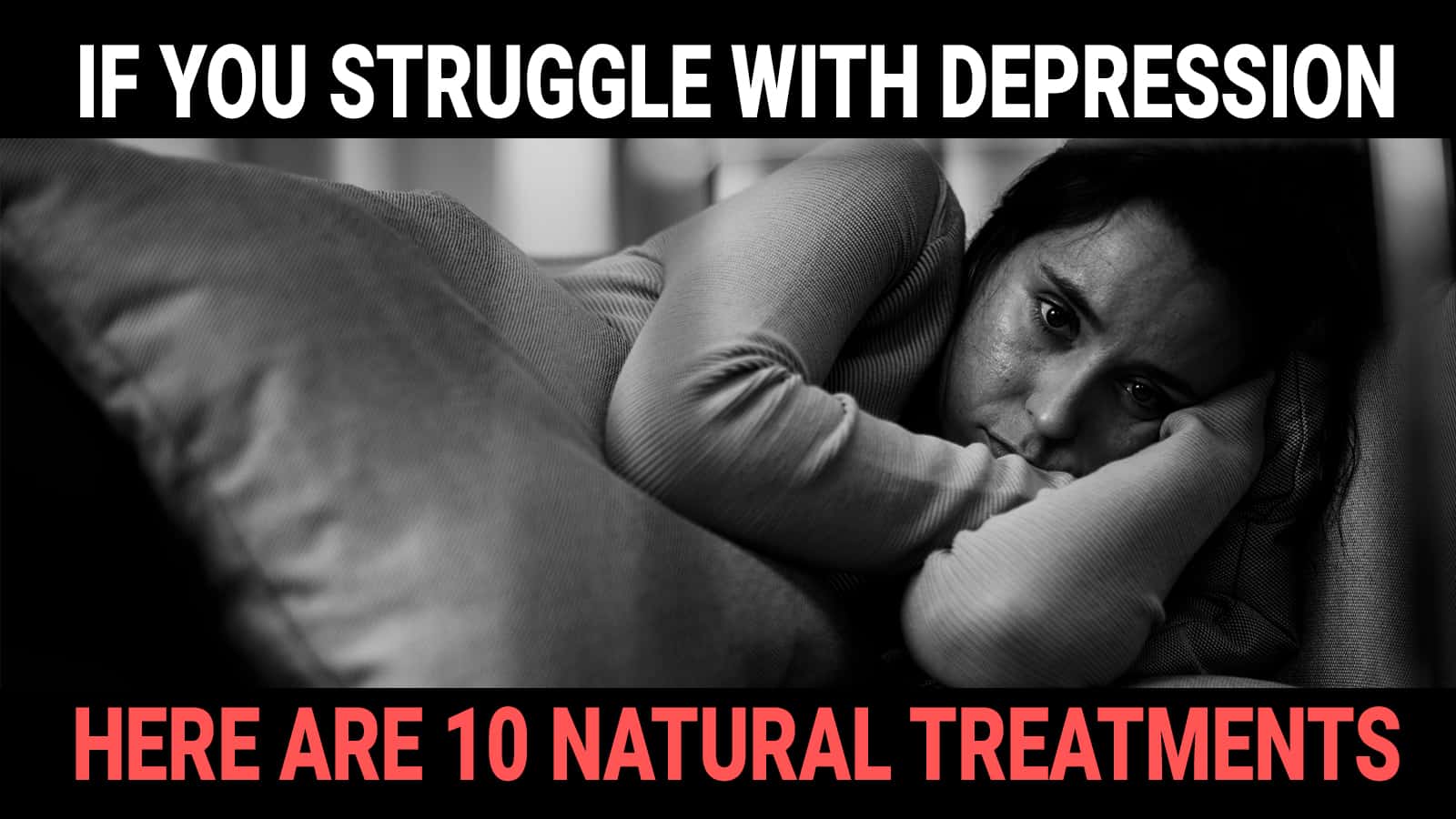Depression is a serious issue affecting more people than one may think. Some treatments can be harsh and reduce the quality of life for those who suffer. One of the best ways to fight it head-on is to figure out the root cause of your condition.
While any one treatment may not work for everyone, there are plenty of natural methods that anyone can try. It is all about finding the best combination that works for you.
Here are a few tips to get you motivated and feeling better:
- Don’t stay still.
- Get up, walk, dance, work out, move your body. This creates endorphins and endorphins generate a sense of happiness and well-being.
- Don’t skip meals, but do try to go for healthier options that enhance serotonin.
Here are a few serotonin-enhancing foods you can try.
- Foods high in Omega 3s
- Eggs, salmon, and spinach
- Healthy Fats
Avoid things like caffeine and get plenty of sunlight. Rule out medical issues that may be the underlying cause of your depression. Some of these may include hormone imbalances and adrenal or thyroid gland issues.
Depression treatment will only take you so far. When you are battling this condition, you do not want to go it alone. Reaching out can be the single hardest thing you have to consider. You need at least one trusted person you can share with openly and without judgment.
You can also seek out a support group in your area or even online. Working through your emotions and considering more natural depression treatments can make all of the difference in the way you feel, ultimately restoring your quality of life.
This is both a mental and physical battle; some days you might have to force yourself to do those things you must do to get through.
Herbal Remedies May Work To Beat Depression
When it comes to depression treatments, herbal remedies have been a global solution. It is the Western region that has gravitated towards pharmaceuticals. Its estimated that one in four women living in the US is taking a psychiatric drug regularly.
The National Center for Health Statistics (NCHS) released a report which states that the use of psychiatric drugs for individuals over 12 has increased by nearly 400% between 1988 to 1994 and from 2005 to 2008. Today, one out of every ten people are taking antidepressants. Whether or not antidepressants are effective is up for considerable debate.
Take note that many other countries are still utilizing herbal remedies to treat depression.
What Are The Symptoms Of Depression?
This illness can be hiding in plain sight. Some people can function with it daily, but their struggle is unimaginable. Others can be outright debilitated by it. Often these people are mistaken for lazy, shy, or quiet. Someone can be temporarily depressed due to an external event while others may be hit with it out of nowhere. If the situation lasts for more than a week and has any of the following symptoms, their condition may be clinical.
- No Motivation.
- Appetite Changes.
- Changes in Self Care.
- Not Wanting to Leave the House (Isolating).
- Loss of Interest.
- Sleep Disorders.
- Withdrawing from Normal Activities.
- Change in Concentration.
- Feelings of Guilt.
- Feelings of Worthlessness or Failure.
- Self Harm, Thoughts of Suicide.
- Avoiding Interactions with Others.
- Irritability.
Just because you are not suicidal doesn’t mean that you aren’t in a depressive state. If you are experiencing these issues, there are plenty of depression treatments out there, but it is crucial also to start seeking out healthy coping skills to go along with the treatment plan that you choose.
A few good coping skills to remember are as follows:
- Find ways to be of service to other people.
- Set realistic and workable goals.
- Don’t have a mindset of failure when things don’t work out; instead, try to find the lesson in everything.
Make yourself go to events and partake in the things you once loved even if at first it’s challenging. Don’t allow yourself to become complacent or stuck in a rut. Try to exercise and eat healthy while also getting plenty of rest (but not too much). Make the effort to be around positive people. Doing these things is critical, and more so when you don’t want to do them.
Some alternatives to antidepressants can be found here.
1. St. Johns Wort
This is a splendid option for the individual seeking a natural remedy to treat his or her depressive feelings. This is a well-known herb with great benefits when taken correctly. There are few side effects, if any, and it is excellent for anxiety as well as creating a sense of well-being, according to the National Institutes of Health (NIH).
Start with a twice a day regimen of 450 mg each. Expect it to take about four weeks to become regulated in your system and reach its maximum effectiveness. Make it a point to consult your primary care physician if you are on any medications because it commonly causes interactions with several prescription drugs. It can also minimize the effectiveness of birth control.
2. L-Theanine
This can be taken in 100-600 mg doses daily. This can also be found in green tea, which is full of antioxidants. Include things like fish oil and S-adenosylmethionine. SAM-e is a mood-boosting chemical which mimics your natural endorphins and body’s genetic chemicals which make you feel happy. This is not a drug you will want to take in addition to any other antidepressants. While it is not controlled in the US, it is only offered as a prescription in Europe.
3. Oran Lavender Oil
Trying lavender oil coupled with meditation and maybe even yoga can help you find relief from the blues. Not only is lavender oil calming, but it also helps you rest better. You can now get lavender oil in a capsule for oral ingestion that will reduce your anxiety and have a calming effect. This oral solution is known as Lavela. It is safe and not habit forming.
4. Valerian root
Valerian root is a great way to treat this situation naturally. It is a fantastic herb for sleep, and getting plenty of rest is essential to feeling well. This is a herb that also works as an anxiolytic with mild antidepressant qualities.
5. Ashwagandha
This is commonly referred to as Indian ginseng. It is a widely used medication in India and has been for more than 6,000 years. Ashwagandha has shown that it is useful for a number of conditions, including depression and bipolar disorder. There have been additional studies proving it helps with obsessive-compulsive disorder while acting as a mood stabilizer.
6. Rhodiola
This herb is native to Europe and Asia and is a great natural way to combat depression. Simply take it twice daily in 100 mg doses. You should increase the dosage by another 100 mg each week, and you can take up to 400 mg daily.
7. Chamomile
Chamomile will help with depression, backed by a study which also proves that it is an excellent solution for those living with generalized anxiety disorder.
8. Maca
Maca, in a 2008 study, proved its worth in fighting several conditions. It also helps you get rest and gives you a peaceful, calm feeling.
9. Ginko Biloba
Ginkgo extract is something of which many are familiar. This is another herb that, though not regulated in the US, is available over the counter or by prescription in Europe. Ginkgo is believed to work by boosting neurotransmitters to treat the situation and offer a sense of well-being.
10. Kava Root
Kava root will reduce anxiety. Some studies say its effects are very similar to valium without the decreased cognitive function. This can be found in many herbal teas.
Try cooking using fresh herbs.
Our diet plays a huge role in our well-being, mentally and physically. Not only are healthier foods a great way to help your natural remedies be more effective in treating your condition, but cooking with fresh herbs can boost your progress as well. You can still have meat and potatoes, for example, but just add fresh rosemary. This is a woody herb that is excellent for flavoring meat, cooking oil, potatoes, and many other dishes. It also has antidepressant and anxiolytic properties.
Thyme is another must have in your spice cabinet. This is a great source of lithium and tryptophan, creating a mood-stabilizing effect. If you like a good roast, rub it down with garlic and thyme. You can also use it on things like eggplant and any dishes to which you will be adding peppers.
Saffron may be a bit pricey, but a little will go a long way. This is believed to treat your ailments naturally. It is great in dishes like biryani. Don’t use too much because saffron can cause some side effects.
None of the above mentioned natural depression treatments are meant to be a substitute for medical attention. Since everything that is “claimed” to be safe and natural may not be, always do your research. It is generally a good idea to consult a physician before beginning a new regimen, especially if you are already taking other medications. Be mindful that these are not FDA regulated as are prescribed medications.
Always deal with a company or brand that you trust and use well researched or known products from those companies.


















